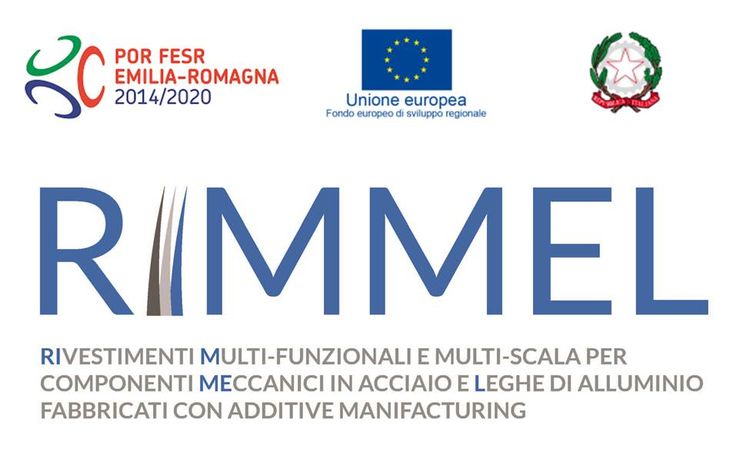This website uses cookies so that we can provide you with the best user experience possible. Cookie information is stored in your browser and performs functions such as recognising you when you return to our website and helping our team to understand which sections of the website you find most interesting and useful. More information in our Privacy Policy
RIMMEL
Multi-Functional and Multi-Scale Coatings for Steel- and Aluminum Alloy-Based Mechanical Components Fabricated via Additive Manufacturing
Principal Investigator: Mariarosa Raimondo
Involved personnel: Alessandro Corozzi
Administrative management & Financial reporting: Laura Mengozzi
Starting date: 07/15/2019
Duration: 24 months
Total funding: 795.814,38 €
Action: POR-FESR Emilia Romagna 2014-2020
Project Coordinator: Sergio Valeri (CNR-NANO S3, Modena)
Consortium: CNR-NANO S3 (Modena), CNR-ISTEC, Università di Modena e Reggio Emilia – INTERMECH MO.RE., Università di Ferrara – Laboratorio MechLav, Università di Bologna – CIRI MAM.
Involved companies: STS S.r.l. PVD Technologies & special tools (Casalecchio di Reno, BO), Nextcoating S.r.l. (Zola Predosa, BO), Beam.It S.p.A. (Fornovo di Taro, PR).
Official website: https://rimmel.nano.cnr.it/
The introduction of new technologies for materials manufacturing heavily relies on science and technologies for functionalization via surface coatings and/or treatments. This holds especially for the field of metallic mechanical components, in which the importance of fabrication via additive manufacturing is increasing along with the request for surface functionalization methodologies/technologies that are compatible with the characteristics of these “new” materials.
The project aims to develop fabrication technologies and characterization/validation methodologies for multi-functional, multi-scale coatings for steel- and aluminum alloys-based mechanical components fabricated via additive manufacturing. The investigation is focused on coatings whose multifunctionality will be regulated through multilayer configurations (possibly with micro- and nano-additives) finished with self-lubricating materials like diamond-like carbon (DLC), tungsten carbide (WC/C), molybdenum disulfide (MoS2). The desired functionalities will be mainly related to coating tribologic performances (friction, wear, tribo-corrosion) and mechanical ones (static and dynamic), associated with corrosion resistance properties, hydrophobicity, and oleophobicity, the latter being able to have an impact on durability and lubrication, respectively.
The multi-scale approach will be oriented to explore and define miniaturization dimensional limits (thickness of the different layers of the coatings, diameter of additive particles) compatible with performances retention, with the objectives of: i) saving in raw materials and fabrication time; ii) bio-mimetic and compensatory properties of the coatings; iii) identification and enhancement of properties generated from the small scale.

